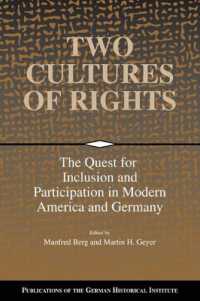- ホーム
- > 洋書
- > 英文書
- > Science / Mathematics
基本説明
Sets out a new way of looking at the transfer of information and the cooperation of groups in planning by exploring the strand of economics known as information economics, including game theory.
Full Description
Trading information is an essential aspect of the negotiations that underpin planning practice across the globe. In this book, Alex Lord uses information economics to outline a way of thinking about these negotiations that places the strategies that actors in the planning game use at the heart of the debate.
Dialogue between economics and planning theorists has been, until now, rare. Lord argues that information economics' tool kit, game theory - including well-known examples such as the Prisoners' Dilemma, the Stag Hunt game and Follow the Leader - offers an analytical framework ideally suited to unpacking planning processes.
This use of game theory to understand how counterparties interact draws together two distinct bodies of literature: firstly the mainstream economics treatment of games in abstract form and, secondly, accounts of actual bargaining in planning practice from a host of international empirical studies.
Providing a novel alternative to existing theories of planning, The Planning Game provides an explanation of how agencies interact in shaping the trajectory of development through the application of game theory to planning practice.
Contents
Introduction Part 1 1. Planning in the 'Information Age' 2. Is There Something Wrong with Planning Theory? 3. Is There an Alternative Way of Understanding Planning? 4. The Infusion of Economics into Planning Thought Part 2 5. Introducing the Planning Game 6. Conflict, Power and Risk 7. Bargaining, Negotiation and Tactics 8. Team Games, Coalitions and Collaboration 9. Putting the Planning Game in Context








